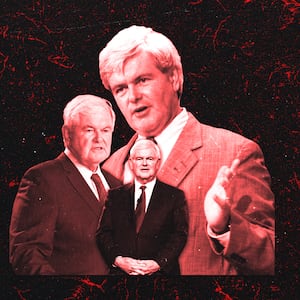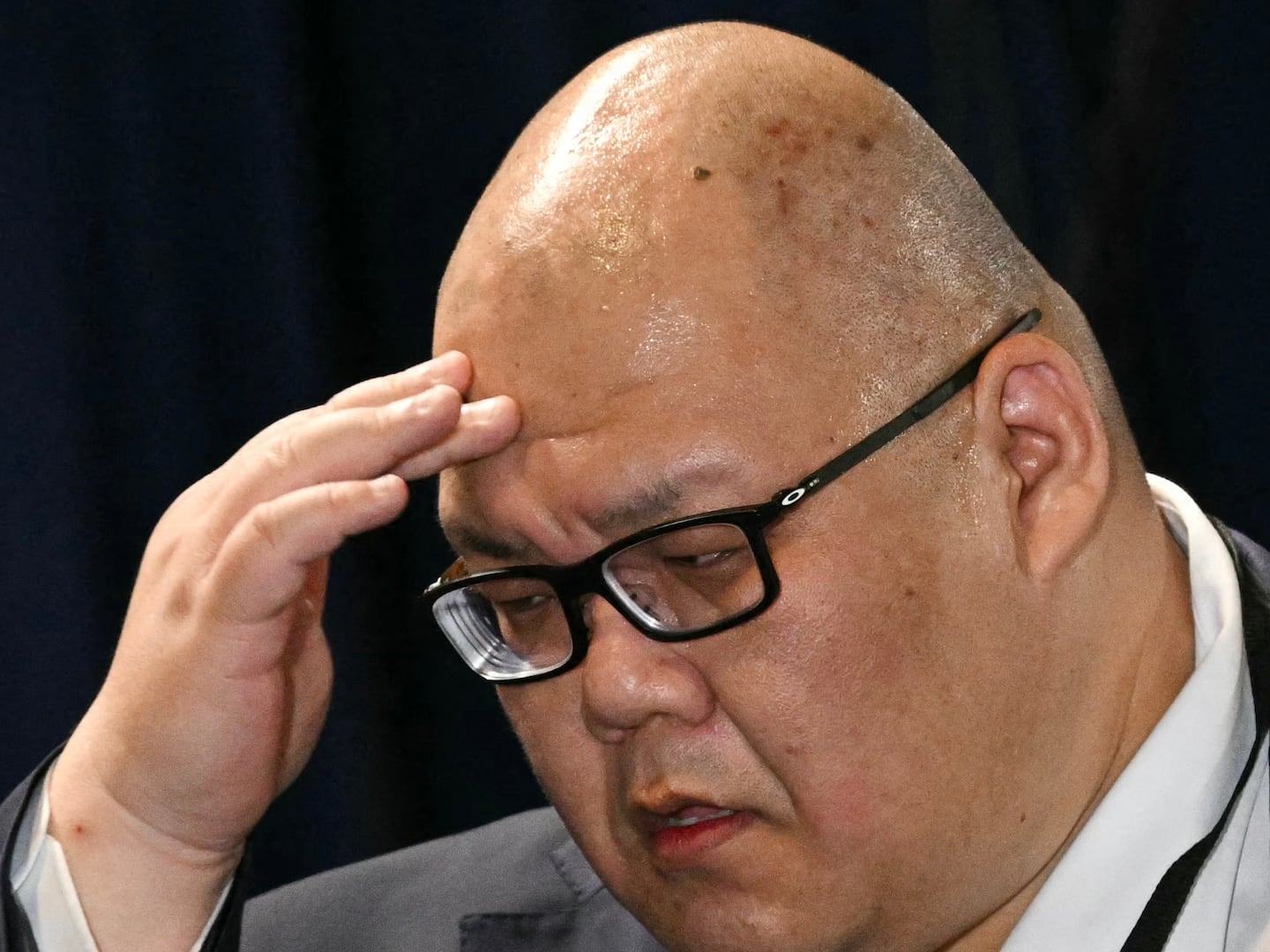You can tell how bad it’s gotten for the GOP when Newt Gingrich rails against the hardliners for disrupting the leadership. The former House Speaker was once the GOP’s biggest disrupter. Running against party insiders and ousting the entrenched GOP leadership was how he got to the top.
Now he’s sounding the alarm about the GOP’s self-inflicted wounds, calling the battle to elect the House’s party leader Kevin McCarthy “a fight between a handful of people and the entire rest of the conference. And they are saying they have the right to screw up everything,” he told Fox News. “These five guys decide to go out as kamikaze and see if they can't sink the whole Republican Party. That's what they are doing. It's not about Kevin McCarthy, it's about the right of any five members to basically throw away the entire rest of the conference and tell the rest of the conference it doesn't matter.”
Gingrich’s antics helped cost President George H. W. Bush his reelection in ‘92, but two years later, the upheaval within the GOP swept in a Republican-controlled House, the first in forty years. Gingrich had no regrets about Bush’s loss, declaring the GOP “liberated from the shackles of the Bush administration,” recalls Jack Pitney, a professor of government at Claremont McKenna College. “He had a lot more freedom to operate.”
For a time, Gingrich reigned supreme in Washington. He was the speaker as the GOP passed bill after bill to enact his Contract with America—which called for welfare reform, congressional term limits, a balanced-budget amendment, and other poll-tested GOP favorites.
Not all made it into law, but they were legitimate issues, unlike what the Freedom Caucus five (and another fifteen GOP outliers) are demanding to make the speakership a living hell for the once presumptive McCarthy, or whoever replaces him.
“These guys are nihilists,” says Pitney. “Back in the day, they called Newt a bomb thrower because he wanted the party to take an aggressive stand against the Democrats. But even Newt and his crew knew there was a time to compromise.”
The current fight within the GOP caucus is about power and personal animus towards McCarthy. Rep. Bob Good (R-VA) said McCarthy was late in congratulating him after he won his primary. Others want more power sharing, to which McCarthy has acceded, giving them most of what they wanted. They still refused to back him.
These nihilists aren’t for anything that American voters rally around. They are caricatures of the modern age, building their brand and seeking personal aggrandizement. “The rebels of the eighties and early nineties were serious about policy,” says Pitney. “There was a lot of criticism of Newt’s Contract with America, but these were ideas people had talked about for years. They were not just soundbites, they wanted to pass legislation.”

House Minority Leader Kevin McCarthy (R-CA), and former Speaker of the House Newt Gingrich, (R-GA), participate in a discussion at the America First Policy Institute's America First Agenda Summit at the Marriott Marquis on Tuesday, July 26, 2022.
Tom Williams/Getty ImagesIt is a commentary on how things have deteriorated that we look back upon Gingrich’s GOP as a more positive time. He was willing to cut deals with President Bill Clinton, notably on welfare reform. Clinton vetoed the legislation twice before finally signing it because it ended federal guarantees and gave states much broader powers. Two top officials in his administration resigned over it.
Gingrich pioneered the game that today’s GOP hardliners are playing. Talking about strategy, he said, “The number one fact about the news media is they love fights.” When he would give “organized, systematic, researched, one-hour lectures—Did CBS rush in and ask if they could tape one of my one-hour lectures? No,” he said. But after he got into an angry exchange with then-Speaker Tip O’Neill, “he and I got 90 seconds at the close of all three network news shows. You have to give them confrontations. When you give them confrontations, you get attention; when you get attention, you can educate.”
The current internal fight is making the GOP look like fools, subject to outrageous demands by a minority within the Freedom Caucus. A majority of the Freedom Caucus supports McCarthy, prompting former Rep. Mick Mulvaney, a co-founder of the far-right conservative group, to recall they originally called it the “Reasonable Nut Job Caucus.”
They wanted to distance themselves from the real crazies, the nihilists who want to blow up the system and, in so doing, are ceding power to the Democrats—if only by showcasing the GOP’s chaos and inability to govern.
In Gingrich’s view, it’s not about Kevin McCarthy, who held 90 percent support from Republicans in the first three House floor votes, it’s about a small minority who are putting the party into “the greatest danger of meltdown” since 1964—when the Republican presidential candidate Sen. Barry Goldwater lost in a landslide to President Lyndon B. Johnson after proclaiming “extremism in the defense of liberty is no vice.”

Rep. Kevin McCarthy (R-CA) sits in the House Chamber during the third round of votes for House Speaker on the opening day of the 118th Congress on Tuesday, January 3, 2023, at the U.S. Capitol in Washington D.C.
Matt McClain/The Washington Post via Getty ImagesGingrich, speaking on Fox News, called McCarthy the only hope for conservatism in Washington right now, “and to undermine him, I think, is to undermine conservatism, the Republican Party, and the country.”
After multiple failed votes where Democratic House leader Rep. Hakeem Jeffries got more votes than McCarthy, lawmakers were hearing from constituents and donors about how “stupid” they look. To the extent the chaos over selecting a speaker foreshadows how the GOP caucus will handle serious government work—like an extension of the debt limit to avoid a global financial meltdown—this new generation of bomb throwers will be “juggling with dynamite,” says Pitney.
Gingrich’s speakership was no picnic. He instigated two government shutdowns, in 1995 and 1996, calling them “a normal part of the constitutional process.” The second one got him a cover picture in the New York Daily News as a crying baby in diapers, after he complained Clinton ignored him on a long flight when they should have been negotiating, and he had to exit Air Force One by the back stairs after attending the funeral of Israeli Prime Minister Yitzhak Rabin.
When Gingrich abruptly stepped down as speaker after the GOP effort to impeach Clinton backfired, and Democrats won seats in the 1998 midterm election, Clinton called him a “worthy adversary” and thanked him for the times they were able to work together.
In the many historic political standoffs of recent years, leaders in both parties have found a way to rebuff the most extreme tactics that would damage our democratic institutions. That is the challenge facing the GOP, however long it takes.









